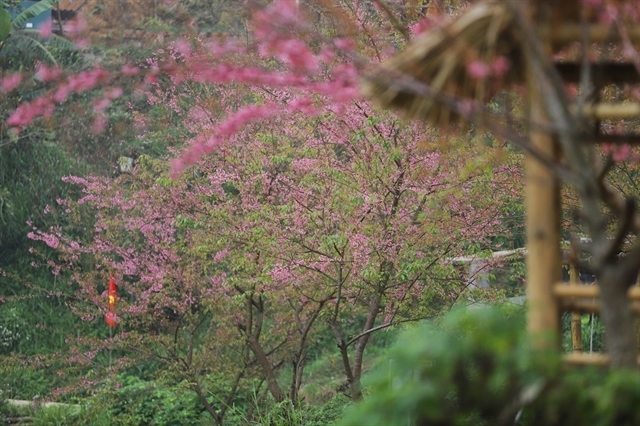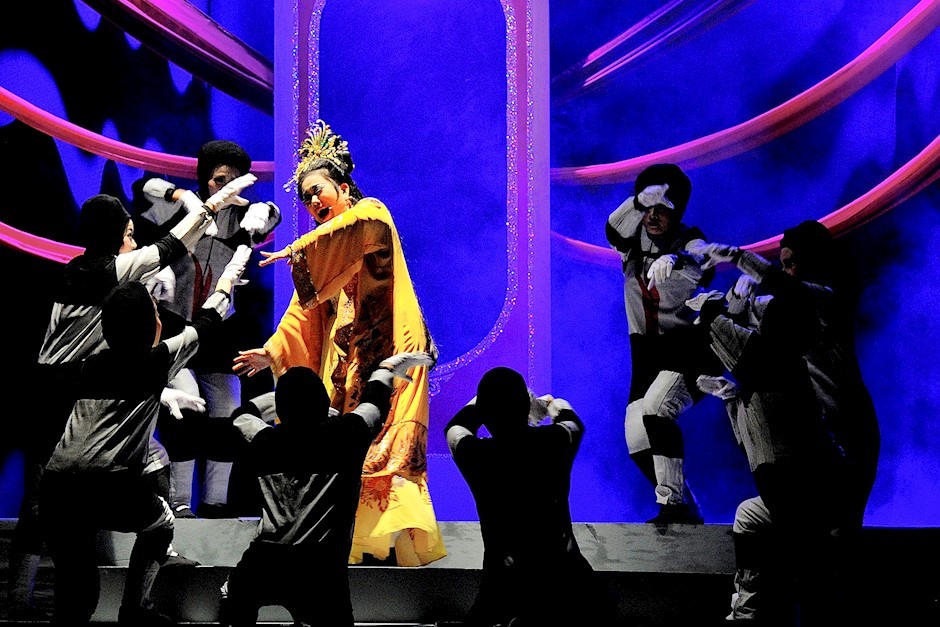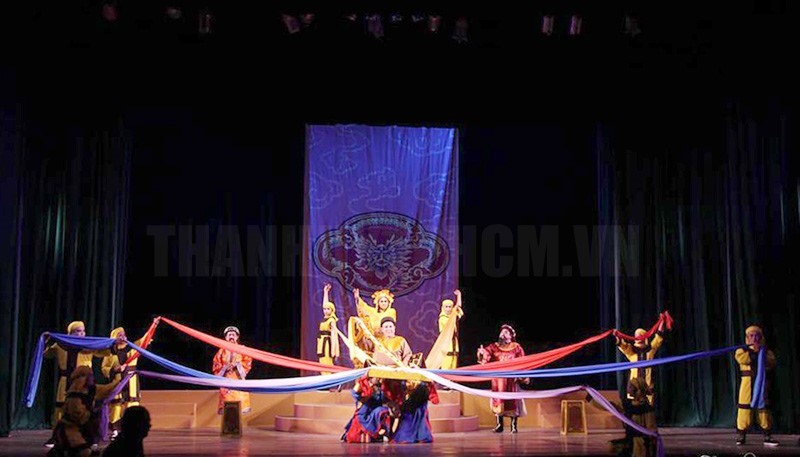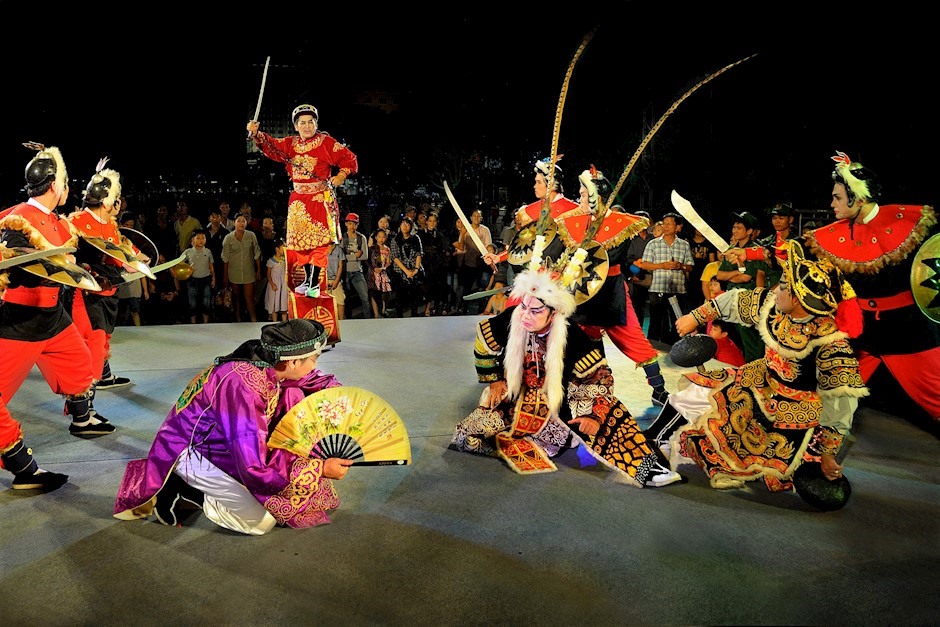 Features
Features

Faced with financial difficulties, theatre troupes in HCM City are working to attract audiences back to tuồng or hát bội (classical drama), a Vietnamese traditional theatre that originated in the 12th century, according to industry insiders.
 |
| Hard work: Artists cannot perform tuồng if they have not been properly trained. The industry is facing a shortage of young and skilled performers.VNS Photo Ngọc Tuyết |
By Thu Anh
Faced with financial difficulties, theatre troupes in HCM City are working to attract audiences back to tuồng or hát bội (classical drama), a Vietnamese traditional theatre that originated in the 12th century, according to industry insiders.
Speaking at a conference on tuồng organised by the HCM City Theatre Artists Association recently, Meritorious Artist Nguyễn Hoàn said: “We’re having difficulties cementing our positions in the theatre business. However, our love for tuồng keeps the art alive.”
“We have worked with private entertainment agencies to improve our business,” he added.
Hoàn, deputy director of the HCM City Hát Bội Theatre, said that his theatre had signed 15 contracts with new partners to offer outdoor shows in cultural houses and temples throughout the country this month.
Three shows offering famous extracts from historical plays, including Vụ Án Lệ Chi Viên (Murder Case at Lệ Chi Garden) and Trần Hưng Đạo (General Trần Hưng Đạo), will be staged to residents in districts 5, 8, 11 and Bình Chánh in HCM City this week .
These works depict the country’s history, culture and traditional lifestyles.
“Outdoor and mobile shows will help to expand our drama among audiences, particularly young people, who prefer pop music and movies,” said Hoàn.
 |
| Passion for art: Veteran and young performers of the HCM City Hát Bội Theatre performed more than 150 shows last year. This year they will stage historical plays at temples and cultural houses around the city. VNS Photo Ngân Anh |
The Huỳnh Long Tuồng Theatre in District 1 will offer three new plays in a classical style, featuring historical events in different periods under the Trần, Đinh and Lý dynasties.
These plays will be staged in cultural houses in rural districts in March and April, the months when people celebrate the Kỳ Yên Festival, a cultural event to worship the villages’ God in the south.
Veteran actress Xuân Yến of the Huỳnh Long troupe said: “Offering outdoor shows helps our theatre make a profit. Although we know that we face a lot of challenges on the way, we believe in the future. We face fierce competition in the market, but this cannot limit our creativity and business.”
This year, the city has more than 70 cultural festivals organised in local temples. Dozens of tuồng theatres and clubs have been invited to perform for residents and visitors during the events.
“I enjoy performing for both adults and children in temples because I see they mostly live in difficulties and are very excited about our art,” said veteran actress Thoại Mỹ, who often performs at the Artists’ Pagoda in Gò Vấp District.
Mỹ and her colleagues, including young talents, find it refreshing to perform for fans here.
They perform cải lương (reformed opera) and tuồng (classical drama) plays featuring historical events and national heroes, such as Trưng Nữ Vương (The Queen’s Sister) and Bạch Đằng Giang (The Bạch Đằng River).
Last year, their shows attracted thousands of residents and visitors.
People’s Artist Đinh Bằng Phi, who has more than 40 years in tuồng, said: “Performing at temples was popular in southern provinces in previous decades. Artists performed outside for local people who wanted entertainment after hard working days.”
“The activity is being lost because of modern life. We’re working to revive performance to encourage fans, particularly young people, so they can learn about and enjoy our art,” he said.
 |
| New generation: Outdoor and mobile shows help to expand tuồng among audiences, particularly young people, who prefer pop music and movies. VNS Photo Ngọc Tuyết |
Last year, HCM City’s Hát Bội Theatre offered more than 150 shows, many of them outdoor, featuring 17 young actors who were trained by the theatre’s leading artists.
Hát bội (or tuồng) is often performed at ceremonies and festivals at temples and pagodas in central and southern provinces, such as Bình Định, Phú Yên, Vĩnh Long, Cần Thơ, Tiền Giang, and Sóc Trăng.
Along with traditional arts such as chèo (traditional opera) in the north and cải lương (reformed theatre) in the south, tuồng has contributed to the spirit and character of the Vietnamese.
The art has three performance styles: tuồng phò (plays based on Chinese old stories), tuồng đồ (plays feature Vietnamese historical events and national heroes) and tuồng hài (comedies about people in daily life).
Artists in the 13th century entertained royalty, and later the art form was adapted and introduced to residents around the region. Stories in hát bội feature historical and social events.
According to Phi, the industry is facing a shortage of young and skilled performers.
Phi, a leader in tuồng, said: “For drama, movies, or catwalk, amateurs can practise and perform a little bit, but for tuồng, you cannot do it if you have not been properly trained."
”Cultural authorities need to invest in producing talented and young crews if tuồng is to truly develop,” added the 81-year-old.
There are only 10 professional tuồng theatres, located in Hà Nội, HCM City, Thanh Hóa, Huế, Đà Nẵng, Bình Định, Phú Yên, and Khánh Hòa.
In 2017, the first private Núi Nhạn Tuồng Troupe opened in Phú Yên’s Tuy Hòa City. It attracted 24 veteran and young actors from Phú Yên and neighbouring provinces. —VNS